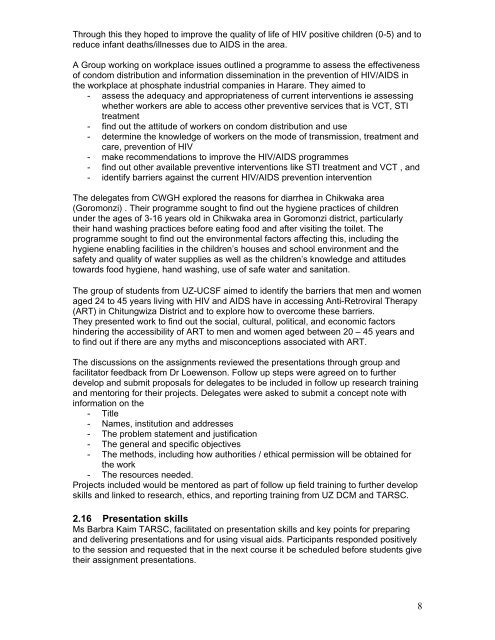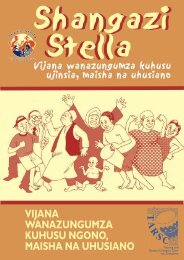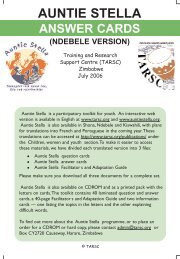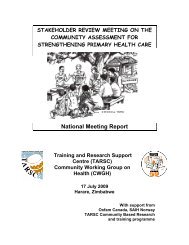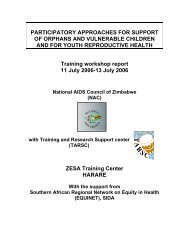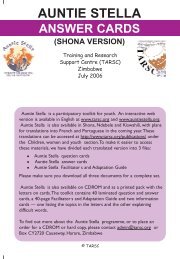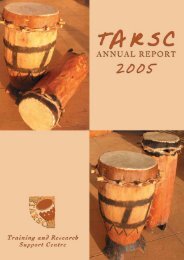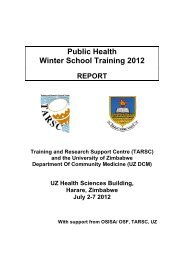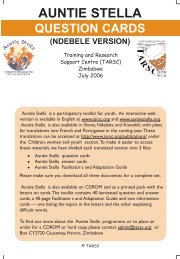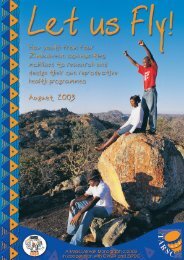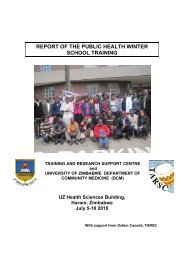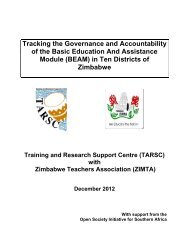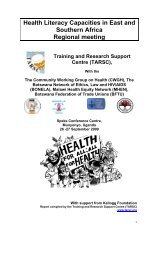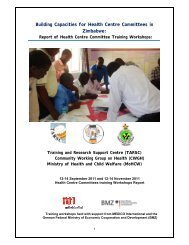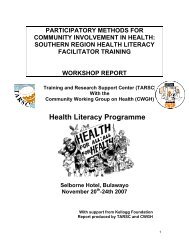WS07 REPORT.pdf - Training and Research Support Centre
WS07 REPORT.pdf - Training and Research Support Centre
WS07 REPORT.pdf - Training and Research Support Centre
You also want an ePaper? Increase the reach of your titles
YUMPU automatically turns print PDFs into web optimized ePapers that Google loves.
Through this they hoped to improve the quality of life of HIV positive children (0-5) <strong>and</strong> to<br />
reduce infant deaths/illnesses due to AIDS in the area.<br />
A Group working on workplace issues outlined a programme to assess the effectiveness<br />
of condom distribution <strong>and</strong> information dissemination in the prevention of HIV/AIDS in<br />
the workplace at phosphate industrial companies in Harare. They aimed to<br />
- assess the adequacy <strong>and</strong> appropriateness of current interventions ie assessing<br />
whether workers are able to access other preventive services that is VCT, STI<br />
treatment<br />
- find out the attitude of workers on condom distribution <strong>and</strong> use<br />
- determine the knowledge of workers on the mode of transmission, treatment <strong>and</strong><br />
care, prevention of HIV<br />
- make recommendations to improve the HIV/AIDS programmes<br />
- find out other available preventive interventions like STI treatment <strong>and</strong> VCT , <strong>and</strong><br />
- identify barriers against the current HIV/AIDS prevention intervention<br />
The delegates from CWGH explored the reasons for diarrhea in Chikwaka area<br />
(Goromonzi) . Their programme sought to find out the hygiene practices of children<br />
under the ages of 3-16 years old in Chikwaka area in Goromonzi district, particularly<br />
their h<strong>and</strong> washing practices before eating food <strong>and</strong> after visiting the toilet. The<br />
programme sought to find out the environmental factors affecting this, including the<br />
hygiene enabling facilities in the children’s houses <strong>and</strong> school environment <strong>and</strong> the<br />
safety <strong>and</strong> quality of water supplies as well as the children’s knowledge <strong>and</strong> attitudes<br />
towards food hygiene, h<strong>and</strong> washing, use of safe water <strong>and</strong> sanitation.<br />
The group of students from UZ-UCSF aimed to identify the barriers that men <strong>and</strong> women<br />
aged 24 to 45 years living with HIV <strong>and</strong> AIDS have in accessing Anti-Retroviral Therapy<br />
(ART) in Chitungwiza District <strong>and</strong> to explore how to overcome these barriers.<br />
They presented work to find out the social, cultural, political, <strong>and</strong> economic factors<br />
hindering the accessibility of ART to men <strong>and</strong> women aged between 20 – 45 years <strong>and</strong><br />
to find out if there are any myths <strong>and</strong> misconceptions associated with ART.<br />
The discussions on the assignments reviewed the presentations through group <strong>and</strong><br />
facilitator feedback from Dr Loewenson. Follow up steps were agreed on to further<br />
develop <strong>and</strong> submit proposals for delegates to be included in follow up research training<br />
<strong>and</strong> mentoring for their projects. Delegates were asked to submit a concept note with<br />
information on the<br />
- Title<br />
- Names, institution <strong>and</strong> addresses<br />
- The problem statement <strong>and</strong> justification<br />
- The general <strong>and</strong> specific objectives<br />
- The methods, including how authorities / ethical permission will be obtained for<br />
the work<br />
- The resources needed.<br />
Projects included would be mentored as part of follow up field training to further develop<br />
skills <strong>and</strong> linked to research, ethics, <strong>and</strong> reporting training from UZ DCM <strong>and</strong> TARSC.<br />
2.16 Presentation skills<br />
Ms Barbra Kaim TARSC, facilitated on presentation skills <strong>and</strong> key points for preparing<br />
<strong>and</strong> delivering presentations <strong>and</strong> for using visual aids. Participants responded positively<br />
to the session <strong>and</strong> requested that in the next course it be scheduled before students give<br />
their assignment presentations.<br />
8


